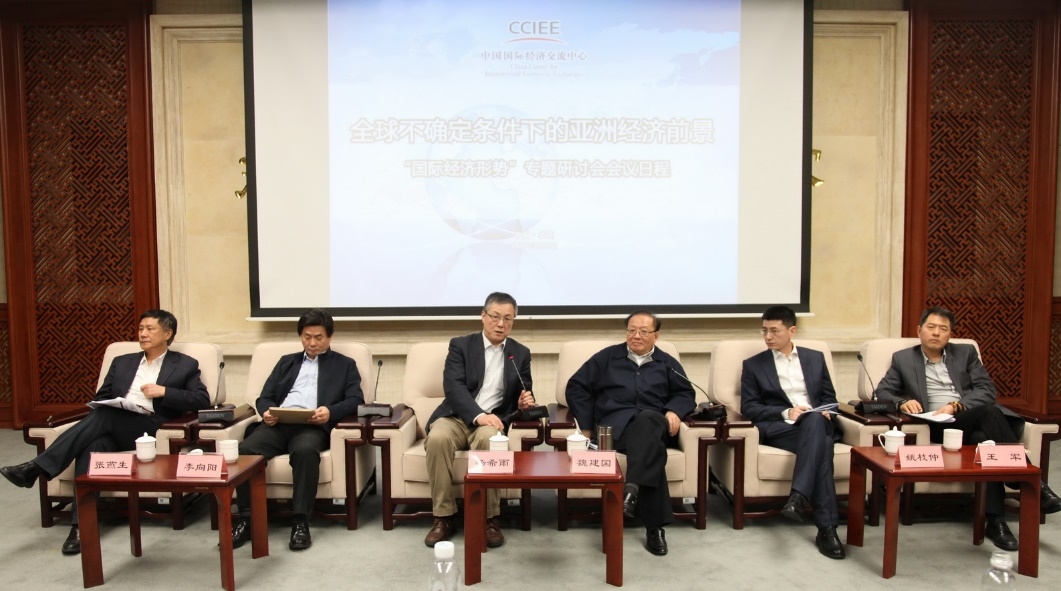CCIEE & Xinhua News Agency National High-end Think Tank Co-host International Economy Seminar: Asia’s Economic Prospects under Global Uncertainties
- Time:2017-03-02
- source:CCIEE
On the afternoon of February 28, 2017, CCIEE and Xinhua News Agency National High-end Think Tank jointly hosted the 5th International Economy Seminar: Asia’s Economic Prospects Under Global Uncertainties. Wei Jianguo, Vice Chairman of CCIEE gave an opening remark. Zhang Yansheng, Chief Researcher of CCIEE, Yang Xiyu, Senior Fellow at China Institute of International Studies and Executive Vice President at the Institute of Boao Forum for Asia, Li Xiangyang, Director of the Institute of Asia Pacific and Global Strategy, Chinese Academy of Social Sciences, Yao Zhizhong, Deputy Director of the Institute of World Economics and Politics, Chinese Academy of Social Sciences and Wang Jun, Director of the Information Department of CCIEE, delivered their speeches respectively. Lu Xinhong, Associate Researcher, Head of World Economy Division of CCIEE, presided over the seminar.

Wei Jianguo pointed out that Asia’s economy is facing more and more uncertainties and the increasing global political risk brings higher risk to Asia’s economic development in the near future. In 2017, Asia’s economic trend is likely to be more uncertain, the economic development of Asian countries will remain unbalanced and the export is not optimistic. To overcome those difficulties, all the nations in Asia should work together to prevent global risks and China should play a leading role and take the responsibility as a rising big nation.
In his speech, Zhang Yansheng expressed that the Chinese and world economy have entered into the period of restorative growth in 2017. Nonetheless, the large differences between Asian countries means that more effort is needed to facilitate economic integration in this region. China should promote Asia economic integration through regional cooperation like the Belt and Road Initiative, RECP (Regional Comprehensive Economic Partnership) and demonstrate the important role Asia can play in accommodating and leading economic globalization. The commodity export of Asia declined in 2016, lower than the export growth of other developed and emerging economies. For the export-oriented Asian economy, such decline means that the structure and model of Asia’s commodity trade need to be transformed urgently. Right now, Asia is changing from a net importer to a net exporter of global capital and it is still a hot hub of global investment in 2017, especially China.
The future development of globalization will have serious effect on Asia’s economy and promoting new globalization will bring Asia and China both opportunities and challenges. How will the new industrial revolution affect Asia’s economy remains uncertain, especially the impact of artificial intelligence on the job market. Amid the new international situation, the US-China relations will surely influence the economic trend of Asia and hence, promote the so-called Beyond Zero Sum Game will be fundamental for China-US cooperation.
Yang Xiyu said that Asia’s economic growth will continue to hold a lead in global economy. The US has considerable impact on Asia’s economy, such as the US trade and monetary policies. The policies toward Asia adopted by the US may trigger many problems and bring risks to this region. China should prepare itself for a possible trade war with the US.
Li Xiangyang noted that Asia’s economy is progressing due to the economic policies of China and the US. The risks facing Asia’s economy is rising, in particular, the risk associated with the East Asia value chain is increasing and Asia’s export-oriented economy is also subject to external shock. The prospects of regional economic cooperation in Asia have become unclear due to the fierce competition between the US and China and thus, China should play a positive role in this regard.
Yao Zhizhong expressed that Asia’s integration will speed up as globalization hindered. At present, the era of a roaring start globalization is over, instead, there has been more doubt on globalization and the anti-globalization force is spreading from developing to developed nations. From the perspective of Asia’s economic pattern, Asia is gaining bigger proportion of global economy, China has become the economic center of Asia, India and Vietnam have also become the new growth points and the division of work within Asia is changing. A strong anti-globalization force did not appear in Asia, plus, Asia is the main driving force of globalization and therefore, the factors deter Asia’s integration will fade away. Asia’s integration has great potential and supporting mechanism, thus, it will move ahead quickly.
Wang Jun believes that the current world economy is under peer pressure to transform its operational model and large nations of Asia take the lead in strengthening cross-border market cooperation and promoting sustainable recovery. The regional economic cooperation in Asia has four features. Firstly, it plays a leading role. Secondly, it is trans-regional. Thirdly, it is a gradual process and lastly, it subjects to geopolitics. Furthermore, Asia’s economic development also has four characteristics. The construction of the Belt and Road Initiative is accelerating, the localization trend of economic cooperation in Asia has become more apparent, the regional economic cooperation in Asia is speeding up and lastly, the Eurasian trade network shows the trend of integration and bipolar optimization.
In the Q&A section, experts answered various questions from the audience and media.
